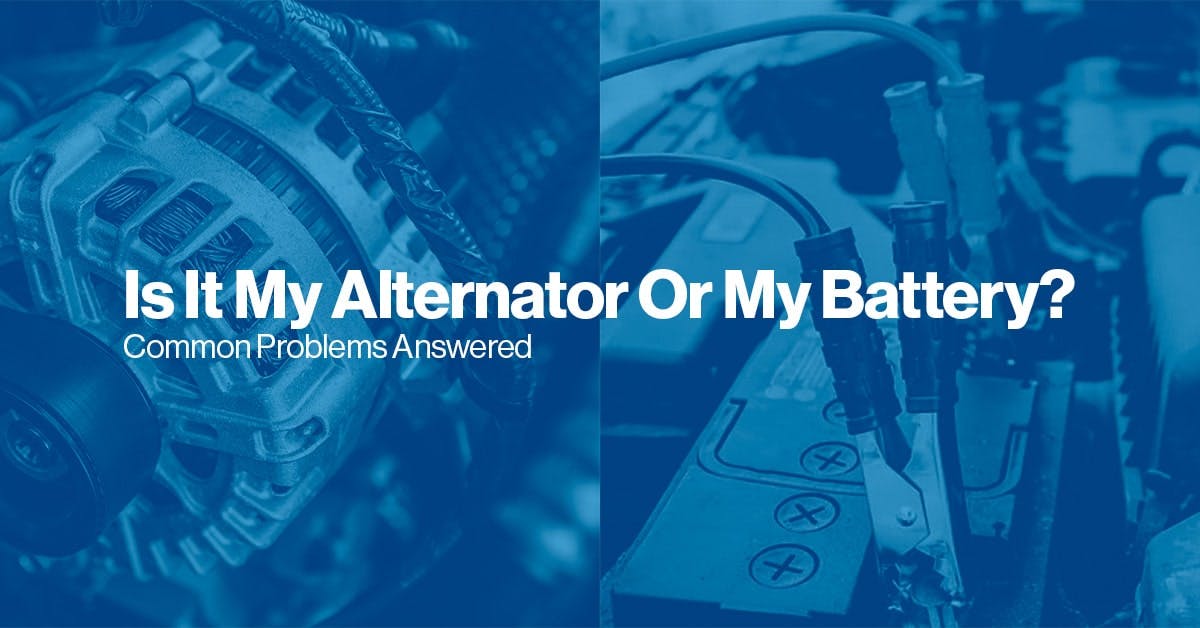As the alternator and battery in your car serve similar purposes, it can be difficult to tell which part is causing problems.
Read on and find out whether your battery or alternator is bad, and the warning signs and problems to look out for.
Page Contents
Is My Alternator Or Battery Bad?
Both the battery and the alternator deliver power, so it can sometimes be difficult to tell which part is to blame.
To tell if the alternator or the battery is bad, you should pay attention when you start your car.
If the car won’t start at all, the battery is dead.
If the car starts but dies after it runs, there is an issue with the alternator.
If the car runs, but won’t hold a charge, it could be either the battery or alternator that is causing the problem.
What Does a Car Battery Do?
The battery is a vital energy storage device that makes sure your car has the power it needs to start and operate the electrical systems.
When you start your engine, the battery sends power to the starter, ignition coils and other related components.
The battery also supplies power to the lights and radio when the engine is off.
What Does an Alternator Do?
The alternator is an essential component of your vehicle's charging system.
It generates electricity to power the electrical systems in your car and recharges the battery whilst the engine runs.
Signs of a Battery Problem
The main signs of a battery problem are:
- Dim dashboard lights
- Dim headlights
- The engine won't start
- A sulphuric smell
Any of these warning signs can signal that your vehicle has a battery problem.
An 'eggy' smell is a sign that your battery is leaking, in which case you must have the battery replaced right away.
The battery may also be dead if the engine won't turn over or takes longer to start.
You can check this by attempting to jump start your car.
If the car stays running for a while but fails to start the next time you try, you probably have a bad battery.
If the car immediately stalls, then it is more likely to be an alternator problem.
Signs of an Alternator Problem
The main signs of an alternator problem are:
- Frequent engine stalling
- Dim or flickering headlights
- Dim or flickering interior lights
- Misbehaving electrics
- A squealing sound
- A burning smell
- A dead battery
You should have your vehicle looked at right away if you notice any of these alternator issues.
Likewise, any strange sounds from the stereo, electric windows that are slow to close or a speedometer showing unusual readings can all point towards a bad alternator.
You may have a slipping alternator belt if you smell burning or hear growling.
If your alternator is failing, then the battery may not have enough charge to start the car - which is why it can be so difficult to tell if the alternator or battery is the cause of the problem.
A professional mechanic will be able to find the source of the issue for you.
Why Is My Battery Failing?
A battery can fail for a number of reasons.
Something as simple as leaving the lights on overnight can drain the battery.
If the vehicle has been subjected to severely cold weather conditions then it could even freeze - especially if the battery isn't fully charge.
Old age and corrosion can also cause a battery to fail.
Why Is My Alternator Failing?
You alternator can fail due to old age or wear and tear.
If engine oil or power steering fluid leaks onto the alternator, this can also cause it to go bad.
Excessive electrical load on the alternator can lead to premature failure, as this puts it under additional strain.
Premature belt wear and overheating can also cause the alternator to stop working.
If there are faulty components within the alternator - like the rotor or voltage regulator - this can cause the alternator to fail.
Any moisture, dirt or corrosion that impacts the alternator can damage its internal components over time - especially if it is subjected to harsh environmental conditions or a leak in the engine compartment.
Lastly, of course, a faulty battery can put strain on the alternator if it struggles to hold a charge.
How Do I Test My Alternator?
If you are certain that your alternator is causing the problem, you can test it using a voltmeter.
This device reads the voltage of your battery and can let you know if your alternator is working correctly.
You can buy a voltmeter from any good automotive shop.
Make sure that the battery is fully charged before you conduct the test.
The voltmeter should read between 12.5 and 12.8 with the engine switched off.
Next, start the engine and read the results.
If your alternator is working correctly, you should see higher readings.
If the readings remain in the 12 volt range, you have an issue with your alternator which needs to be fixed by a professional mechanic.






